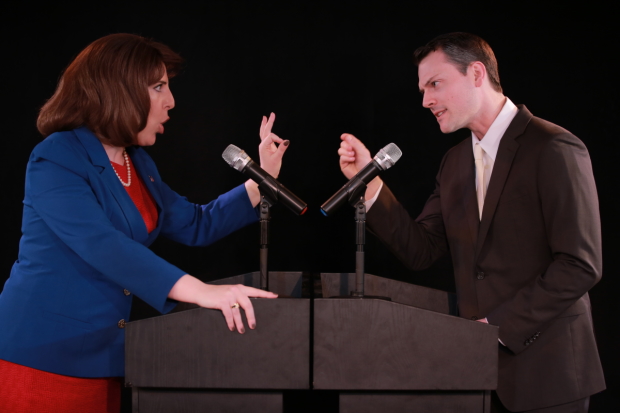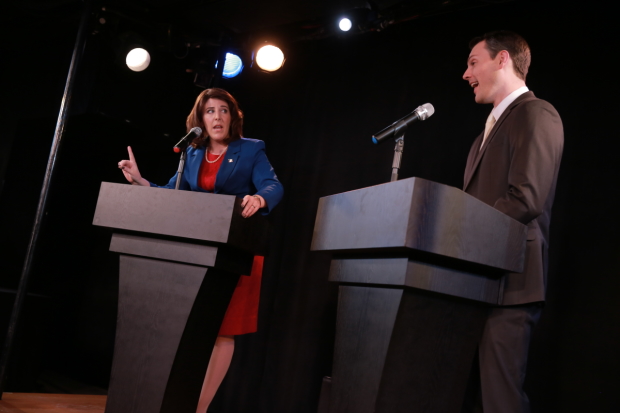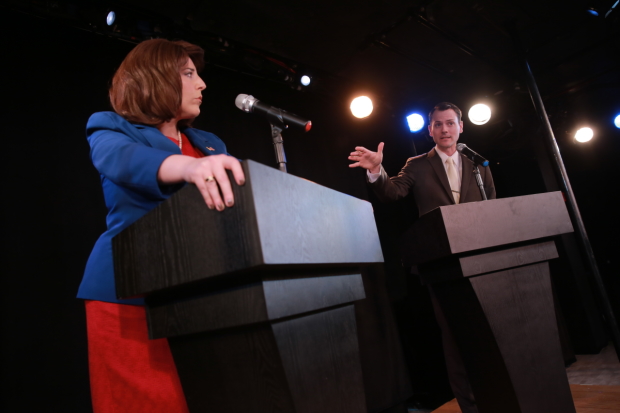
(© Justin Rogers / One March Photography)
Depending on your political persuasion, you may never be able to watch the 2016 presidential debates without experiencing a P.T.S.D. flashback. Conversely, you may want to watch them over and over again, like Norma Desmond reliving her celluloid glory. Maria Guadalupe and Joe Salvatore offer something to confound both groups in Her Opponent, their fascinating live staging of the debates that reimagines Hillary Clinton as a man and Donald Trump as a woman.
Now playing off-Broadway at the Jerry Orbach Theater, Her Opponent began as an academic experiment, and that feeling remains in this 35-minute presentation that is followed by an equally long talkback. Guadalupe is a professor of economics at INSEAD (the European Institute of Business Administration), while Salvatore teaches educational theater at New York University. Their aim was to discover what role gender bias played in our perceptions of the 2016 debates. They first staged this cross-gender selection of excerpts (taken from all three debates) at the Provincetown Playhouse in January, shortly after the inauguration of Donald Trump. The question they raise is this: Would things have gone differently if Hillary Clinton had instead been a man named Jonathan Gordon?

(© Justin Rogers / One March Photography)
Daryl Embry's performance as Gordon suggests not. While confident, his speech is halting and measured, as if he is listening to the advice of tiny consultants living in his ear. He punctuates many of his sentences with a jab of the thumb and eye contact with the audience that is meant to telegraph sincerity. Embry perfectly mimics Clinton's smile: an overbite masquerading as a grin, a display of toothy condescension, which, Salvatore reveals in the talkback, many respondents have described as "punchable." One doubts that New York theater audiences (who regularly greet the Broadway-loving Clinton with a standing ovation) would ever admit to a desire to punch the former first lady.
His opponent, the cartoonish Brenda King, is no more appealing: Rachel Tuggle Whorton plays her with an unamused glare, her head slightly tilted down as if to say, "I'm bigger than all of you." King is a bully, rudely interrupting her opponent and the moderator (a perfectly benign Andy Wagner). But in stark contrast to Gordon's wonkish answers, King conveys her pitch with simplicity and clarity: No fewer than five times, she mentions Gordon's 30-year political career, during which time the problem of money in politics has only gotten worse. Despite his claim to want to fix it, Gordon has only encouraged the problem by accepting major donations, King tells us, lowering her voice an octave for emphasis, "And he'll never change." It's a message that makes sense and sticks with us.
In switching the genders of the candidates, Salvatore (who directs) has attempted to account for every variable: Notice how their names scan exactly the same as their real-life inspirations? Similarly, Salvatore has directed the actors to exactly replicate the candidates' words, phrasing, and gestures. It's a severely restrictive method of staging, but the actors thrive in these limits to deliver spookily on-point performances.
This need for scientific control sometimes leads to awkward choices, like the applause and laugh tracks that stand in for applause and laughter that actually occurred in the Clinton-Trump debates, just in case the live audience misses its cue. The tracks make the event feel more like the live taping of a sitcom than a serious experiment in performance (no sound designer is credited).
Fortunately, Márion Talán's costumes hit the bull's-eye: solid red and blue skirt suits for King, focus-grouped conservative ties for Gordon. Fabulously named hair designer Troy Beard has a bit of fun with King's mane, which has been processed within an inch of its life and combed around her face into a sleek and shiny plastic frame — the kind one only ever sees on a Lego woman. Oh dear…am I commenting on a female candidate's hair? Certainly, a male politician's personal grooming habits would never face such scrutiny.

(© Justin Rogers / One March Photography)
By switching the genders of the two candidates, Guadalupe and Salvatore reveal much about our own gender biases. More profoundly, Her Opponent removes our preconceived notions about the candidates by reassigning their words to unknown entities bearing similar personality traits. Gone are the lecherous television billionaire and the career politician with a history of dishonesty, people whom most Americans have regarded with either admiration or mistrust for decades. Instead, we are forced to listen to their actual words delivered on a clean slate. Obviously, political candidates do not exist in a vacuum, and their track records should absolutely be taken into account when voting (more so than the theatrics of three nights). Still, in the controlled environment of the debate stage, you may be surprised whose arguments win you over.











